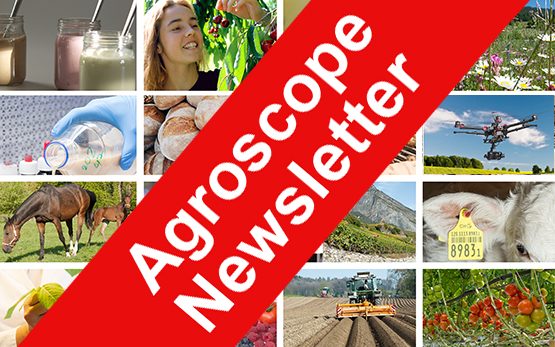Seed Treatment with Steam Is Effective Against Cereal Diseases
Zurich-Reckenholz, 10.11.2020 - Seed treatments aim to protect germinating crops from diseases. In collaboration with the agricultural cooperative fenaco, Agroscope examined thermal methods using steam and warm water, among others, for the treatment of cereal seed. The results demonstrate the great potential of these methods.
In autumn 2017, the Swiss Confederation initiated a national action plan for reducing the risk of plant protection products (see below). In response to this, Agroscope and the agricultural cooperative fenaco, with the additional support of the Hauser Foundation and Sativa Rheinau, launched an ‘Alternative Seed Treatments’ project. In this project, Agroscope tested, among others, the efficiency of warm water and steam treatments of cereal seed in the laboratory and field.
Effective against diseases on the grain surface
The focus was on the plant diseases snow mould, common bunt and loose smut. In the laboratory, Agroscope researchers analysed seed germinability and health after treatment. The advantages of the steam treatment over other methods stood out: treatment time is short, and the method is economical and effective against diseases found on the outside of the grain. A disadvantage of the steam treatment, however, is its ineffectiveness, compared to the costly warm water bath, against diseases found inside the seed, such as the loose-smut pathogen.
Better diagnostics needed
“The steam treatment will be more widely used. In order to additionally improve the protection against pathogens in the seed embryo, it is important to optimize the diagnostic capabilities. The implementation of steam treatments paired with improved disease diagnostics will help further reduce synthetic chemical seed dressings while producing healthy crops.” says Karen Sullam, Head of the ‘Alternative Seed Treatments’ project at Agroscope.
Seed certification must be adapted
A shift from conventional seed dressing to the steam treatment is possible in practice. Years with demanding weather conditions and a high incidence of disease, however, can be a challenge. In the coming years, further data and practical experience will be amassed on this topic. In addition, the seed certification process must be adapted by conducting small-scale tests in advance to determine the optimal treatment conditions for each batch of seed.
Further information
- Background to the joint research project: Scientists from Agroscope’s ‘Ecological Plant Protection in Arable Crops’ and ‘Seed Quality’ Research Groups carried out field trials and laboratory analyses with winter wheat and winter barley between 2018–2019 and 2019–2020. Based on the findings of this research, the agricultural cooperative fenaco will now implement the steam treatment. Details are given in fenaco’s press release (link below, in german or french). To ensure quality control, Agroscope will analyse samples of untreated and steam-treated seed in the future.
- National Action Plan for Reducing Plant-Protection Products: In September 2017, the Swiss Federal Council adopted the Action Plan for Risk Reduction and Sustainable Use of Plant Protection Products (Federal Council press release of 6 September 2017). The basic principle of the Action Plan is that chemical-synthetic control measures are only to be used if there is no other way of ensuring adequate plant protection.
- Seed dressing today: To date, chemical-synthetic seed dressing in cereal production has been an important preventive measure for protecting seed from pests and fungal diseases (e.g. bunt diseases). Healthy bread and fodder grains are of major importance for Switzerland’s security of supply. Seed-borne diseases such as snow mould (Microdochium majus), common- and dwarf bunt (Tilletia caries / Tilletia controversa) and loose bunt (Ustilago spp.) lead to high yield losses. Additionally, the metabolites of common bunt also endanger the health of both humans and animals.
Address for enquiries
Karen Sullam
Research Group Ecological Plant Protection in Arable Crops
Agroscope, Reckenholzstrasse 191, 8046 Zurich
Agroscope Media Service
Schwarzenburgstrasse 161, 3003 Bern
media@agroscope.admin.ch
Tel. +41 58 466 88 62
Publisher
AGROSCOPE
http://www.agroscope.admin.ch






